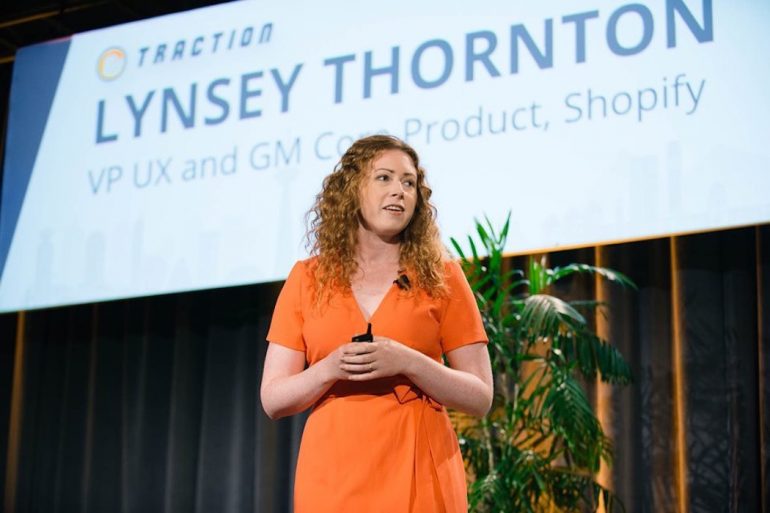Scaling from an online shop builder into powering 800,000 businesses in approximately 175 countries takes a lot more than timing. The behaviours, mindset, and commitment to a core mission can be critical from the early days of a startup, to past IPO. Few know that better than Lynsey Thornton, Shopify’s vice president UX and general manager of core product.
“The longest-lasting companies inherently know that they are playing an infinite game.”
Thornton has been with Shopify for the last six years as one of the key drivers behind the e-commerce platform’s success. Thornton recently spoke at this year’s Traction Conference in Vancouver, about the importance for startups to make mission-driven decisions for sustainable, long-term growth.
BetaKit spoke with Thornton at Traction about how Shopify has been sticking to its own mission, and the lessons she has learned at Shopify.
Playing the infinite game
Thornton said from her own experience at Shopify, and speaking to hundreds of business owners, she’s found that the most successful companies root their mindset in what scholar James P. Carse called “infinite games.” No rules, no clear boundaries, and an environment in which the game being played is continually changing.
“If you think of your business as an infinite game, an ever-changing landscape with no rules, then it becomes more and more easy to see how important your mission is,” she said. “Business writers and analysts agree, the longest-lasting companies inherently know that they are playing an infinite game.”
RELATED: Shopify to host program for developers reentering tech industry after extended leaves
Thornton used examples like IKEA, Microsoft, and Patagonia, for how companies used their own mission statements to become “100-year companies.” Patagonia, for example, looked at the impact of its supply chain on the environment, and subsequently changed its statement to one that resonated with its target market: “We’re in business to save our home planet.”
“There’s no suggestion that by playing a long term or infinite game, you don’t have to consider short term plays,” Thornton acknowledged. “Obviously, you have to continue to play short term to stay in the game long term. But if you consider them with a lot of effort and effect around your mission, then you increase your odds of getting knocked out of the game long term, pretty substantially.”
Shopify’s own mission is to “make commerce better for everyone, so businesses can focus on what they do best: building and selling their products.” Thornton stated that this message is displayed all over the office, but the keys to making a mission statement tangible, attainable, and pervasive are not so explicit.
Thornton told BetaKit she had never known the mission of other companies that she had worked for, and that was a shocking realization.
“Since I’ve joined up, [the mission has] been a huge focus,” she said. “It’s just so front and centre in all of the decision-making. It’s part of the culture. It’s all over the office and walls, but we really do use it every day, in trade-offs and decisions that we make about what to invest, and not invest, in.”
Making it tangible
Pinpointing a mission statement can be one challenge for a business, but a simple sentence can seem elusive and ultimately unattainable in reality.
“If you’re working towards the mission, everything is easier when your customers trust you.”
For Thornton, a key task in making Shopify’s mission tangible was to define the central group of people most pivotal to Shopify’s mission. For Shopify, it was merchants and entrepreneurs who were the most central catalyst behind whether or not Shopify could achieve its mission. The question then became, how can Shopify make entrepreneurship better?
“There’s plenty of problems in the entrepreneurship space, for example, enterprise. If we only do enterprise products, we’re definitely going to make more money,” she said. “But when we asked ourselves the question of does that lead to more entrepreneurs in the future? The answer was scary.”
“So instead, we’ve sent the company in a way that different groups can focus on different types of entrepreneurs at different stages.”
Identifying the issues that entrepreneurs face can appear to be a series of short term goals with little return on investment, but for Shopify, it was an important direction to go in, to help it achieve its long term mission.
Creating culture
Thornton said short-term thinking can often be the tool to keep a company accountable to its mission. That often means expanding the vision to beyond a company’s core market, and looking both outward to a partner community, and inward, to the team.
“When we IPO’d in 2015, we were really worried about this effect of short term thinking and not building for the long term,” she said. “We were worried the team were going to think that the IPO was the pinnacle of our journey. Of course, that was not true. That was the start.”
RELATED: The three e-commerce game changers announced at Shopify Unite 2019
Investing in products, services, and experiences that build customer trust does not come with a short term ROI, she said, so it makes long-term thinking more difficult to incentivize. But expanding one’s focus can often help get closer to achieving its mission. In order to develop a culture around a long term mission, Thornton said the company made sure to avoid incentivizing this short-term thinking and building trust.
“If you’re working towards the mission, everything is easier when your customers trust you,” she said.
Thornton told BetaKit despite having merchants and business owners as the customer, she learned about the importance of the market that exists of the periphery of business owners, such as marketing agencies, customer service, and engineering. Making sure that Shopify could have a positive effect on that entire community too, was central.
Image courtesy Traction Conference


